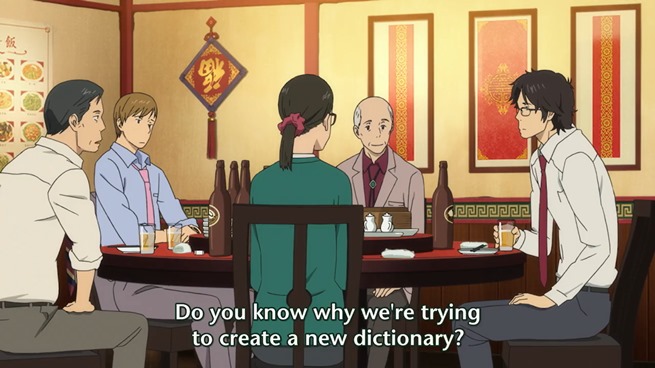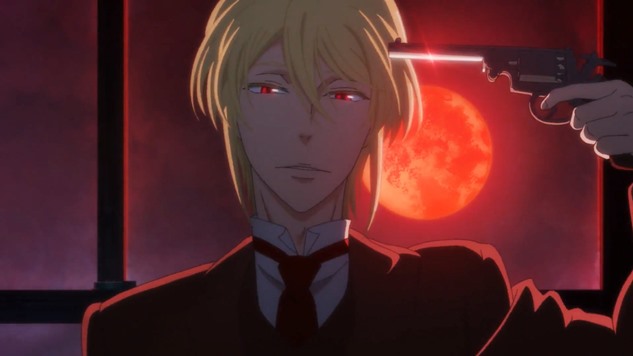Wonderful slice-of-life anime The Great Passage premieres – Today in History, October 14th, 2016

Today in History – The Great Passage (aka Fune wo Amu) is a helluva lovely surprise
On October 14th, 2016, the anime adaptation of Shion Miura’s novel The Great Passage aka Fune wo Amu premiered.
It is a slice-of-life anime that follows Genbu Publishing salesman Mitsuya Majime, as he is offered a position in the company’s Dictionary Editorial Department by an editor who is retiring.
His job? To help create a new dictionary called The Great Passage.
The problem? Dictionaries typically take years to create, as every word and its meaning has to be checked, rewritten, checked again, while decisions must be made about the words to include and those to leave out.
On top of that, creating a new dictionary takes a lot of money and, nowadays, dictionaries don’t always make back the money they cost.
Mitsuya Majime is chosen by the editor Kouhei Araki because, although his people skills are poor, he is detail-oriented, careful and loves reading. Just what a new dictionary needs, eh?
And for me, when I read the synopsis of The Great Passage anime, I thought “Wow, this one sounds dull”.
One episode in, however, and I was captivated not only by what it takes to create a dictionary and the immensely difficult work involved, but also with the complexity of the characters in the publishing company and at the boarding house where Majime lives.
RELATED: The Great Passage opening theme song by Taiiku Okazaki is a bloody fabulous song!
That’s one of the reasons why I chose to profile The Great Passage for Today in History, October 14th, 2016, as this anime is such an incredibly lovely gem so many people have still missed.
The Great Passage staff
The staff of The Great Passage created a stunning work that is absolutely unique, and second to none in its quality, story-telling, character development, animation and art style.
The staff are:
- The series is directed by Toshimasa Kuroyanagi, who is known for his work on Bakuten!!, Say “I Love You.” and the anime film Love Me, Love Me Not. His lovingly crafted, intense deep dive into the world of dictionary editing in that particularly quirky Japanese way I love so much is one of the things that sets this anime apart.
- Takuya Satou was in charge of series composition, and went on to create a touching and truly memorable story the likes of which I have not watched before or since.
- Character design was carried out by Hiroyuki Aoyama, who did a brilliant job making the characters so very ordinary yet so utterly wonderful. He was also the chief animation director.

The Great Passage’s voice cast
The anime voice cast is one of the best I have ever heard as, while this quiet little story does not really include intensely dramatic scenes, the slowness, quietness and poignancy of the plot and its characters is done is such a rich and touching way by every actor involved.
That voice cast features some of the industry’s most successful VAs:
- Mitsuya Majime is voiced by Takahiro Sakurai (Suguru Getou in Jujutsu Kaisen) – A young man passionate about words, drawn to the unique challenge of dictionary creation.
- Masashi Nishioka is played by Hiroshi Kamiya (Sensei in No Longer Allowed in Another World) – One of the Dictionary Editorial Department’s editors, and an open and incredibly friendly man who eventually becomes Majiime’s best friend.
- Kaguya Hayashi voiced by Maaya Sakamoto (Merlin in The Seven Deadly Sins) – A young woman who is the granddaughter of Majime’s landlady, an aspiring chef, and the one Majime loves.
- Kouhei Araki is voiced by Tetsuo Kanao (Kokuyou in Dr. Stone) – He is Chief of the Dictionary Editorial Department, and the man who offers Majime a job.
- Take is played by Ikuko Tani (Chairman Jiang in Scissor Seven) – Take is Majime’s landlady, Hayashi’s grandmother and a gentle, sweet, kind lady who takes good care of her tenant.
Why did The Great Passage appeal to slice-of-life fans so much?
Realism and Depth: The show delves into the nuances of work culture in Japan, focusing on an unusual yet profoundly human endeavor. This resonated with viewers who appreciate shows that mirror real-life struggles and aspirations.
Character Development: Each character in The Great Passage undergoes significant growth, not through dramatic events but through everyday challenges and interactions.
This slow, organic development is a staple in slice-of-life genres, where character depth is often more crucial than plot twists.
Themes of Legacy and Passion: The anime explores themes of legacy, the impact of one’s work on future generations, and the quiet heroism of dedicating one’s life to a seemingly mundane task.
For fans, this narrative provided a refreshing and quite chill contrast to the often fantastical or high-stakes settings of mainstream anime.
Emotional Resonance: With its focus on personal relationships and the beauty of language, the series tugs at the heartstrings, offering a touching look at love, loss, camaraderie, and what it means to feel fulfilled in life.
Artistic Style and Sound: The appropriately down-to-earth visual style complements the story’s tone with its simplicity of lines that still manage to show an incredible attention to detail.
The Great Passage is still a hidden gem more should discover
The Great Passage might not ever have been one of anime’s biggest hits, but for those who appreciate the quiet moments of life, the theme of dedication to one’s craft, and the power of language, it remains a poignant reminder of the beauty that can often be found in the ordinary.
This anime, which premiered on October 14th, 2016 and is the subject of our Today in History on this day, continues to be a cherished yet still hidden gem in the slice-of-life genre, proving that sometimes, the most profound stories are told in the simplest of settings.
Learn more about the anime, and add it to your Absolutely Really Really Really Must Watch list over on My Anime List.
You can watch The Great Passage (aka Fune wo Amu) via Amazon Prime.






